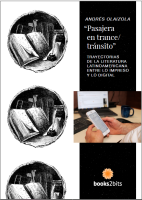Books2bits reading formats:
Free and open reading: links on the page of each book
PDFs direct sales (directs to a Google form)
E-books on Amazon
Printed at Servicop and bookstores distributor Bibliomanager
The information and communication technologies that began to develop after the Second World War and that experienced technical complexity from the last decades of the 20th century and the first years of the 21st century, as a result of the digitization of the media, the Increased storage capacity and processing speed of equipment, portability, and interconnectivity of devices, transformed the ways of filing information, building knowledge, reading, and writing. Interconnected digital environments, with their distinctive features and formal characteristics, allow expanding the conception of writing and reading. Printed literature, therefore, will meet the electronic, the digital, in what Juan José Mendoza calls an "interdiscursive crossroads" that defines one of the most paradigmatic intercultural contexts for thinking about the writings of the present.
Literature, in the books on which Olaizola reflects, delineate trajectories between the digital and the printed, and in doing so, when they are about to conform, through practice, to an object/text/project, within the framework of a medium, of a specific device, with its aesthetic and communicational potentialities and limitations, they do not. They avoid the will and the power to become a finished object/text/project and are established in a permanent trance from the transit in and through the digital sphere and the printed sphere. Literature today develops in a scenario where transmedia is one more aesthetic procedure; and precisely transmedia, which is based on the passage of an element from one medium to another, implies a process of transposition, since a theme, aesthetic, story, discourse, character, world, among other aspects, must be translated into another language, to another mode of composition. In fact, it is expected that each medium develops its communicative and aesthetic potentialities and, at the same time, preserves its specificity. The texts, the projects, and the Latin American literary objects that execute passages between the printed and the digital assume that transposition, that translation is one of the forms of writing. These transits/trances of literature imply the crossing of limits, but above all, different ways of bonding with other people. This movement towards other spaces, towards other subjects necessarily entails, at a minimum, an interpellation, and at a maximum, a transgression and subversion.
ISBN 978-987-47971-3-1 (print)
ISBN 978-987-47971-4-8 (ebook)
ISBN 978-987-47971-5-5 (PDF)
Read this book in Open Access on Adaptive Rich Reader
For sale at:
Digital format (Kindle) in Amazon
Digital format (PDF) in BajaLibros
Paper format in Argentina (and the rest of the world by DHL):
Servicop
Servicop Mercado Libre
Cite this book: Olaizola, A. (2022). "Passenger in trance/transit": Trajectories of Latin American literature between the printed and the digital. La Plata - Mexico - Barcelona: Books2bits. (Essays. Pluriverse thoughts; 1). https://doi.org/10.51438/B2Bolaizola2022
Author biography
Andrés Olaizola

(Buenos Aires, 1981). Bachelor of Arts (UBA), University Professor of Arts (UP), Master of Higher Education (UP). CONICET Doctoral Fellow. He is a professor at IES Nº 1 “Dra. Alicia Moreau de Justo” (CABA) and attached to the chair Problems of Latin American Literature “B” (UBA). He was a teacher-researcher at the University of Palermo. He has made an assignment at the Institute of Hispanic American Literature (FFyL, UBA). He has been part of several research projects, both as a director and as a research member. He is the author of articles and essays published in Argentine and Latin American academic and popular journals. "Passenger in a trance/transit". Trajectories of Latin American literature between the printed and the digital is his first book.


This work is licensed under a Creative Commons Attribution-NonCommercial-NoDerivatives 4.0 International License.
Books2bits reading formats:
Free and open reading: links on the page of each book
PDFs direct sales (directs to a Google form)
E-books on Amazon
Printed at Servicop and bookstores distributor Bibliomanager
 Licencia Creative Commons Atribución – No Comercial – Sin Obra Derivada 4.0 Internacional
Licencia Creative Commons Atribución – No Comercial – Sin Obra Derivada 4.0 Internacional
Argentina: Calle 69 n 1083 e/ 16 y 17 | (1900) La Plata | Province of Buenos Aires
Mare de Deu de Lorda, 45, Primero | (08033) Barcelona | España
Email: editorialbooks2b@gmail.com
Phone: +34 671 47 35 71
Made with OMP Open Monograph Press
Owner: Hermes Data S. A. de C. V.
Intellectual Property Registration pending
